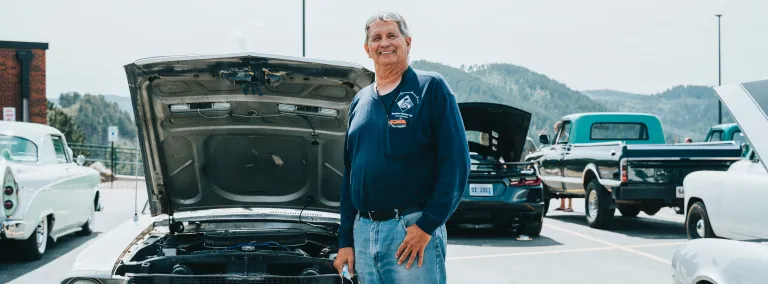Jack (of all trades) retires from SURF
Jackson Pahl will retire this spring after 34 years at the facility
When asked “what he does” at the Sanford Underground Research Facility (SURF), Jackson Pahl can’t help but chuckle.
“I come to work with a plan for the day and within five minutes of being here, it's all out the window. I’m off doing something else,” Pahl said.
Pahl’s official title is Facilities Technician, which, loosely interpreted, means he does just about everything. He clears snow from roads and sidewalks. He guides contractors around the facility. He supports the warehouse, checking inventory and making deliveries. He welds. He moves furniture. He builds furniture. He fabricates handrails for the staircases, builds bookcases and installs window shades.
With his name and job description, he’s commonly called a “Jack of all trades.” And though he playfully replies, “and a master of none!” Pahl knows that the complete adage—“A jack of all trades is a master of none, but oftentimes better than a master of one”—is a well-deserved compliment.
In many respects, his wide-ranging work at SURF mirrors his life. Pahl has been a pilot, a lab technician, a small business owner, a truck driver, a miner and more. His varied career path isn’t driven by passing curiosities, but by a desire to develop expertise and understanding. “I love finding things that expand my knowledge and help me to grow,” Pahl said.
Just getting started
An aviation sciences course at Pahl’s Minnesota high school piqued his interest in flight. By senior year, Pahl had his pilot’s license. His interest in film photography introduced him to working with chemicals in the school’s photo lab. That lead to a summer job with FMC Corporation, developing their photos and running tests in their chemistry lab.
After high school, Pahl became an entrepreneur. He noticed that concrete trucks struggled to access remote construction sites without their wheels sinking into Minnesota’s soggy ground. He and a friend built a fleet of small, lightweight concrete trucks that could travel over the mud where larger trucks couldn’t. The two soon sold their company and, with his profits, Pahl bought a semitruck to haul cattle across the nation.
When the 1979 energy crisis more than doubled the cost of diesel, Pahl sold his semitruck and secured a job as a ski instructor at Snow King Mountain Resort in Jackson Hole, Wyoming. But to this day, he has never skied Snow King.
“I had six days before I was supposed to start at Snow King,” Pahl recalled. “On my way there, I stopped in Lead to visit my older brother. But I got a job with Homestake and never left!”
A home in Lead
Pahl joined a family tradition by hiring on as a miner. “My dad, my grandparents, my uncles—they all worked at Homestake. On holidays when family would get together, everybody talked about mining. It’s in the blood.”
After seven years spent “breaking rock,” Pahl applied to work at Homestake’s Waste Water Treatment Plant. The plant, which had been running for just two years, was designed to extract cyanide and other mining contaminants from wastewater before it was released into local waterways. Homestake chemists and biologists had created and patented the technique, but it was still being perfected. For 13 years, Pahl helped refine Homestake’s water treatment methods.
In 1999, three years before the Homestake’s closure, Pahl found job in Colorado. He managed maintenance teams for a city government and a large company. Soon, he was back in South Dakota, helping Ellsworth Air Force Base operate their wastewater treatment plant.
Finally, in 2008, he got a call to come home.
The Homestake Gold Mine was being transformed into an underground research facility. The Waste Water Treatment Plant had been stagnant for years, and it would take an experienced team to return the plant to operation.
“There were burst pipes and split lines, seized pumps and stuff that just didn't work,” Pahl said. “We spent the first month beating on things, putting stuff together, cleaning junk out. There was a lot of maintenance that needed to be caught up on.”
Pahl stayed at the plant for nine years as the team further tweaked and refined the water treatment process. Then, Pahl was invited to join SURF’s surface operations team, where he has worked until his retirement.
“Jackson is the definition of a self-starter. His skills in multiple fields, along with his can-do attitude, mean he’s always ready to assist—whenever and whatever is needed,” said Dan Regan, buildings and grounds foreman at SURF and Pahl’s supervisor. “Jackson will be greatly missed by our team.”
Looking to retirement
Pahl’s retirement will likely look a lot like his career: busy.
Pahl fashions hand-made rocking horses for his great nieces and nephews (as he once did for their parents 25 years ago). He owns a metal fabrication business (the “Miles Beyond Ordinary” sign straddling Highway 85 includes his handiwork). He programs metalworking equipment (for which he’s written his own Computer Numerical Control). He helps run the drag strip in Sturgis (a 660-foot track where 7-second sprints are pure acceleration). He restores old cars (the current project is a 1968 Mustang California Special, but five more cars and 14 motorcycles await transformation in his shop).
“I’ve got a thousand things lined up,” Pahl said. “I’ll be 186 years old by the time I get it all finished!”
Of all he’s built, there’s one accomplishment of which Pahl is most proud: 40 years of marriage to his wife, Aloah. “She’s an amazing woman,” Pahl said. “To put up with all the stuff I do, and never bat an eye. She’s been the rock. The place to ground.”
With retirement, he’ll miss his friends at SURF—but not too much. Even after officially retiring, Pahl will remain a part-time member of the facility’s Emergency Rescue Team.
